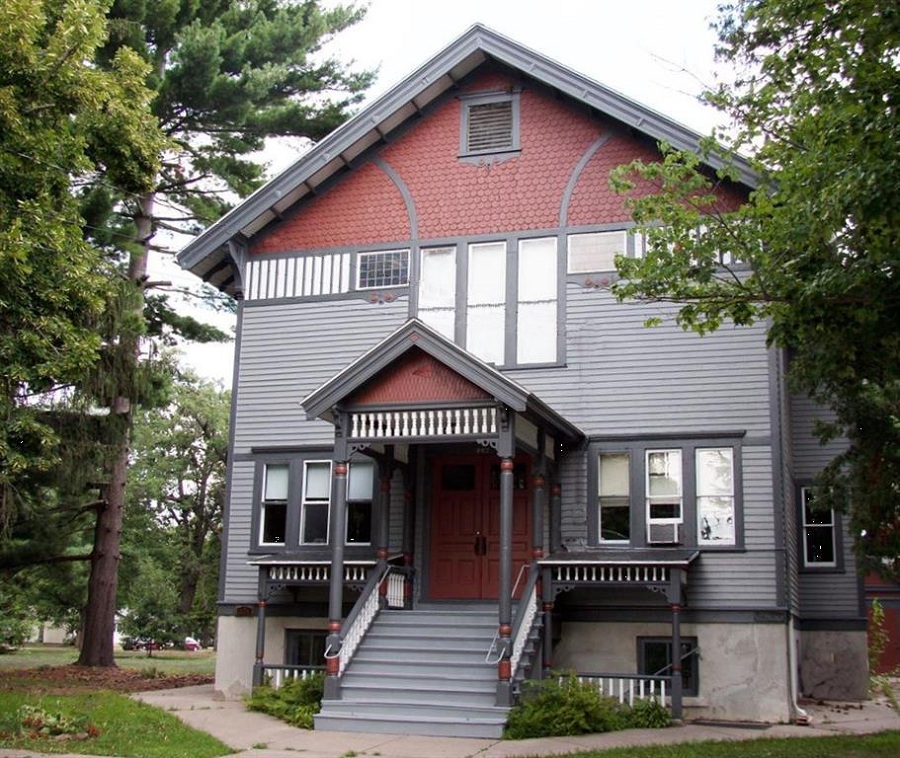
Free Congregation
of Sauk County
Free Thought in religion since 1852
Our History
The “Freethinkers” Story
On October 24, 1852, exactly 80 “Germans of Sauk City and the surrounding area” signed the call for organizing the Freie Gemeinde von Sauk County, Wisconsin. (Freie Gemeinde means “Free Congregation” or “Free Society” in German.) These founders had come to the United States from several of the German states in the wake of the failed liberal revolution of 1848, seeking freedom to practice their beliefs, express their thoughts, and search for the truth without interference from government and church authorities.
Park Hall from the balcony
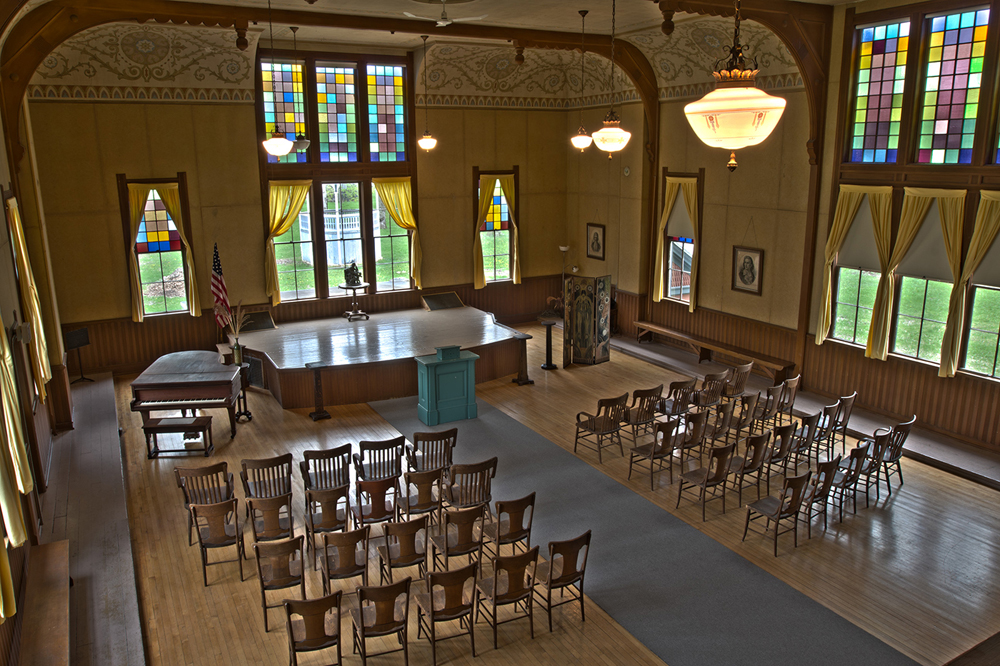
The Freie Gemeinden upon which this one was modeled were part of a scattered movement that followed in the path of the many reform movements that swept Europe in the early 1800s. Among these were calls within the Protestant, Catholic, and Jewish faith communities for greater tolerance of non-orthodox views and practices. A galvanizing event of the religious reform movement was the excommunication, in December of 1844, of Johannes Ronge (1813-1887) from the Catholic Church. Ronge, an inconspicuous priest from a Catholic parish in a small town in Silesia, had burst onto the German religious scene as a result of his widely circulated letter protesting the carnival-like public exhibition of what was purported to be Christ’s Holy Cloak by Bishop Arnoldi of Trier - and protesting, in particular, the Bishop’s promise to the populace that their sins would be forgiven and their ailments healed if only they were to touch the cloak… and deposit a cash offering in the church’s collection box! Shortly after his excommunication, Ronge issued a call throughout the German states for those “determined to break the coercion of belief, to purify religion, and to lead the church to its true calling, to the calling which the needs of our people and the spirit of these times lay upon her, namely: to reconcile the nations and the peoples of the earth through the cultivation and advancement of love and freedom for all…. We must declare ourselves free from the Roman church and from the pope and build a German Catholic church.” The call was answered from across Germany, and especially from Breslau (now Wroclaw, Poland), which was known for its Enlightenment spirit and devotion to rational belief. Thus was born the Free Christian or German-Catholic (DeutschkatholischeKirche) movement. Its slogan was “Investigation and Progress.” The movement’s first congregation - the Universal Christian Congregation - was established in Breslau in February, 1845, under Ronge. By Easter Sunday, March 23, the church had 7,000 members.
The Free German Catholic movement began not as anti-religious but as anti-clerical and, especially, anti-Roman. Many of the participants, like Ronge, did not question the doctrine or dogma of the church as much as the institution. At that time in the German states, little if any separation between church and state existed, and you could be jailed or banished by the government for questioning the authority of the church. (“Germany” as a united nation did not exist until the 1870s when the German Empire under Bismarck confederated the various states, kingdoms, duchies, “free cities”, etc.) Even today in Germany there are remnants of those close ties. For example, Germans today can choose to have the government take their church pledges (“Kirchensteuer”) directly from their paychecks.
In 1845 Eduard Schroeter (1811-1888) joined this movement. He began to speak out against the Catholic and Lutheran clergy in the city of Worms, the city made famous by the trials of Martin Luther 300 years earlier. Schroeter formed his own Freie Gemeinde, which eventually severed all ties with recognized churches.
Ronge and Schroeter were not alone in speaking out against the injustices of the established churches. Many religious liberals joined a Free German-Catholic movement; others joined non-denominational humanist groups. Most were well-educated, culturally active people. Many were persecuted. Some of those who suffered persecution fled the country, with many of them immigrating to the United States. This wave of immigration grew following the failed Revolution of 1848, which was not so much a single uprising as a pervasive unrest that simmered and occasionally broke out into violence in many different states of Germany throughout the 1840s. The suppression of these pockets of protest, more or less accomplished by 1848, resulted in a mass migration to the U.S. over the next few years - hence the name “48ers” for those immigrants who fled their homeland.
Freie Gemeinden in America - keeping their German names and never referring to themselves as “churches” - spread throughout the U.S. after the first one was established in St. Louis in 1850. Gemeinden formed in Pennsylvania, California, Washington, D.C., New York, Illinois, Wisconsin, and Texas, among other states. By 1852 there were twenty-six discrete groups in Wisconsin alone.
Carl Duerr was a key figure in the earliest days of the Freie Gemeinde von Sauk County, the group that came to be better known, especially among its non-member neighbors, as the Sauk City Freethinkers. Duerr had been working on a large farm near Merrimac, where he was part of a small humanist group, before he moved to the southern part of Prairie du Sac in 1852. (This part of Prairie du Sac was separately incorporated as Sauk City in 1853.) There he began to gather a congregation of like-minded people, in which he took the role of temporary Speaker. The formal organization of this congregation, the Freie Gemeinde von Sauk County, would not occur until the arrival, later that year, of Eduard Schroeter.
Schroeter arrived in America on July 11, 1850, after having been forced into exile by the Grand Duke of Hesse-Darmstadt. He soon formed a number of Free Congregations in cities throughout New England and New York. In the summer of 1851 Schroeter came to Milwaukee, Wisconsin, where, within a few months, he began to publish a weekly German language paper called the Humanist, the first religious periodical to be published in Wisconsin.
Eduard Schroeter best articulated the Free Thought philosophy in his Fundamental Principles, first published in the Milwaukee Banner (August, 1851):
We call our society the United Free German Congregation. Its purpose is to unite the foes of clericalism, official dishonesty, and hypocrisy, and to unite the friends of truth, uprightness, and honesty - all those holding the same views, but now found scattered among all religions, churches, and sects. By such a union of our strength we intend to erect a firm bulwark against the pernicious system of church, sect, and clerical domination. While making our first appeal to the Germans we do not wish to be understood as excluding other nationalities; rather we shall make it our business to enter into fraternal relations with others who are aiming at reforms similar to our own.
All authority rests in the congregation, and in it all its members, men and women alike, shall have equal rights. The foundation for the congregation shall be Reason, and the great teachings of Nature and History. The purpose of the congregation shall not be the subjection of human beings to an external authority, the respect for a person or a book, in order to secure their bliss by such unconditional obedience, but the exact opposite of this, their mental and moral freedom, their independence and individuality in thought, will, decision, and action. The means to this end, consequently, are not “supernatural and incomprehensible means of grace,” but the natural and comprehensible means by which a human being influences and inspires the mind and heart of his fellows - through speech, song, and the mutual exchange of opinions.
We do not exclude certain rites and ceremonies, so long as they are not compulsory and are sensible and beautiful (i.e. in connection with birth, death, marriage etc.). We have no dogmas or decrees, fixed for all time, but only fundamental principles and general views of the world which are subject to continual clarification. We seek to attain for ourselves an independent view of life and in accordance with it to shape our individual lives. For us there are atheists only in a practical sense: those, namely, who act as if there were no supreme law of the world to which they are subject, and no world order to which they are obliged to conform. We decree neither a belief nor a disbelief in God and immortality. We know of no priestly office as the sole bearer of the spirit and the truth, nor of a laity as mere empty vessels to be filled by it, as the Catholic and Protestant churches do, to a greater or lesser extent. But we do recognize a speaker or teacher, whom the congregation is free to select and appoint after it has satisfied itself of his vocation, qualification, and moral character.
These remarkable affirmations emphasize the anticlerical zest of the movement, for even though the governments of the German states, not the church, forced Schroeter and his contemporaries to flee their homeland, they considered church and state as co-conspirators in suppression. Moreover, the church played a much greater role in everyday lives, and the people believed that the church should be a refuge from and buffer against governmental tyranny, not an instrument of it.
After a year of publishing the Humanist, Schroeter decided to take a personal tour of Free Congregations in Wisconsin in the summer of 1852. He visited Sauk City’s Free Congregation in October, where he formally organized the group that had been started by Carl Duerr. It’s possible this was not Schroeter’s only trip to Sauk City that month, as we know that in late October he married Elise Cunradi Graepel, a widow. (Schroeter’s first wife died on New Year’s Day, 1851, less than six months after their arrival in New York.) A Robert Cunradi is listed as one of the 80 original founders of the Freie Gemeinde von Sauk County.
In January of 1853, the Freie Gemeinde von Sauk County invited Schroeter to take the role of Speaker. January of 1853 also marked the congregation’s first celebration of the birth of Thomas Paine (b. January 29, 1737), an American revolutionary whose writings on liberty, democracy, and the separation of church and state were especially influential among German Free Thought groups. In June of 1853, Schroeter was formally installed as Speaker - delivering an address entitled “My Task as Speaker” - and the Freie Gemeinde von Sauk County was officially incorporated. In honor of the occasion, the congregation celebrated the first Frühlingsfest (Spring Festival); this was followed, in October of 1853, by the first Stiftungsfest (Founders Day). These three annual events - Painefest, Frühlingsfest, and Stiftungsfest - are still celebrated today.
The congregation used “Sauk County” rather than “Sauk City” in its name because it drew its membership from a number of villages and the surrounding countryside. Weekly Sunday morning meetings alternated among four locations: Sauk City, Honey Creek (the location of the Free Congregation cemetery), Merrimac, and the village of Dane. Of these, Sauk City and Honey Creek had the largest membership.
In 1857 the congregation constructed a new hall in Sauk City and, a year later, started a school with instruction in both German and English. Although classes were taught by hired teachers, Schroeter participated in the instruction, particularly in the subjects of religion, philosophy, and ethics. Music became an important part of the Sunday meetings and festive gatherings; it remains so to this day. Literary, poetical, and musical performances were offered for the community as a whole, particularly in the winter months.
Honey Creek Hall at the Andrew Roll Cemetery
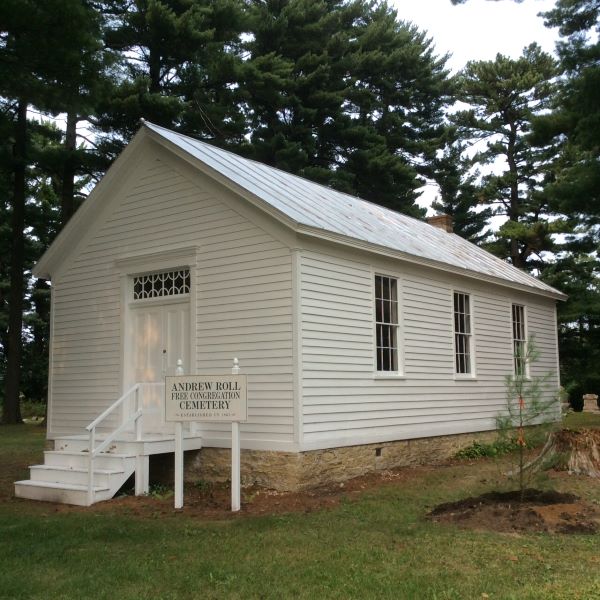
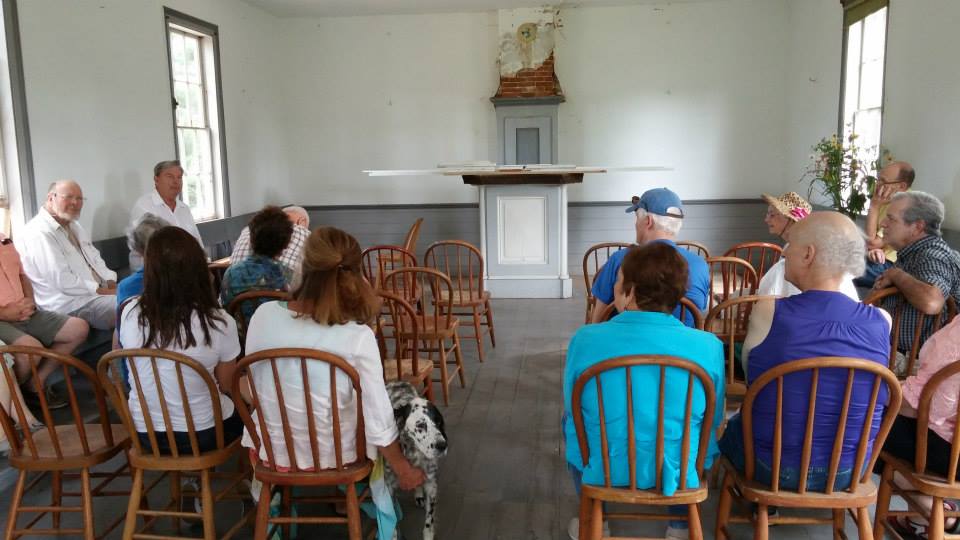
In 1861, members from the Honey Creek area received permission from the congregation to build their own hall, next to the cemetery on Slotty Road. At that time, it was decided that all members would have the privilege of a free burial. The majestic alleys of white pines, which so dominate this location, were planted in 1866, having been transported as saplings from Pine Valley in the Baraboo Hills. The cemetery was later named the Andrew Roll Free Congregation Cemetery in honor of the man who donated the land. The Free Congregation of Sauk County (FCSC) still meets at the Honey Insert picture of Honey Creek Hall: Creek/Cemetery Hall once a year. A men’s group from the congregation has very recently begun meeting there on a monthly basis, undertaking some much needed upkeep as well.
In September of 1876 the congregation purchased the Free Congregation Park for $300. Soon to be the home of Park Hall, the site was located just north of Sauk City’s original plat of 1852.
In April, 1886, Eduard Schroeter, in failing health, resigned as Speaker after serving thirty-three years. For several years prior to his resignation he had earnestly pleaded with the congregation to appoint a younger man in his place. He died on April 22, 1888, at the age of 72. Perhaps as a tribute to his eminence, the congregation never hired another permanent Speaker. Schroeter’s influence on the congregation continued well into the next century, as testified by many people who had studied under him in their childhood.
Park Hall, still known locally as Freethinkers Hall, was constructed in 1884, designed by Sauk City born architect Alfred Clas. (His father, Adam, a charter member of the congregation and a carpenter by trade, had built the Honey Creek Hall.) Clas is best known for his designs (with his business partner George Bowman Ferry) of the Pabst mansion in Milwaukee (1892), the Milwaukee Public Library (1895), the Wisconsin Historical Society Building in Madison (1900), and Olin House (1911) in Madison’s University Heights, now the UW-Madison Chancellor’s residence.
The Frauenverein (Women’s Association; it is sometimes improperly translated as Ladies’ Aid) was organized in 1887. Its primary purpose was to manage the social functions at Park Hall, such as Christmas and Easter entertainments for the children. It also raised money for improvements and renovations to the building, for a time through weekly bakery sales held in the basement. That said, one mustn’t think of the influence of the women of the congregation beginning, belatedly, with the establishment of the Frauenverein. On the contrary, women played a role equal if not greater than their male counterparts in every aspect of the life of the Free Congregation.
Frauenverein
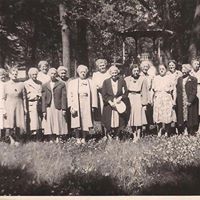
They were the creators and sustainers of the community life; more often than not, women took the roles of librarian, music instructor, teacher, historian - more and more so after the turn of the century, as many of the younger men departed the community for professional jobs in the larger cities. Those women who were not married to the departees -and there were many of these - often did not marry at all. This was due not only to the pressure (which one has to assume operated here as elsewhere) to marry within one’s group; the wider community of Sauk Prairie offered few eligible men who had the educational and intellectual attainment - let alone the capacity to regard the other sex as equal - to measure up to these women.
Until 1937, all programs and activities at the Park Hall were conducted in German. At the urging of the younger members, in particular, the congregation decided to conduct all programs in English. At the same time it translated the original bylaws from German into English, with slight revisions.
By 1940, there were still 111 members in the congregation. Then came World War II, the great war for a great moral cause, which struck at the heart of the FCSC as World War I - which closed hundreds of such congregations and societies across America - could not. More likely, it was the coincidence of World War II and many other social and cultural factors. The educational attainment of the congregation’s younger members had always been, as one might expect, considerable. As in every small town in America, these people left to pursue opportunities elsewhere. Of those few who stayed, some married outside the congregation and were assimilated by the community’s mainstream Protestant and Catholic churches… or chose (or were compelled) to raise their children there. The Free Congregation’s intellectual and cultural “dominion” in the community - to say this of the congregation’s early decades is certainly not an exaggeration - passed into history. In any case, membership numbers - which, remarkably, remained fairly steady for the first half of the century - began to decline after World War II. (Typed membership lists from around 1953 show upward of 70 members, but it is likely that more than a few of these were inactive.)
In the mid-1950s, Ralph Marquardt, president of the FCSC, concerned for the very existence of the congregation and its incomparable history, building, and park, conceived of a plan to link the congregation to a broader and burgeoning community. (Some reports indicate that there was also concern regarding the reactionary political climate of the 1950s and new tax laws that threatened the congregation’s tax exempt status.) On February 19, 1955 the Free Congregation of Sauk County affiliated with the American Unitarian Association (which, in 1961, merged with the Universalist Church of America to form the Unitarian Universalist Association). This affiliation sparked debate, often rancorous, within the congregation, and caused some members - a few of whom were descendants of the original founders - to break with it. The relationship between the “Free Thought” and the UU traditions continues to be a topic of important - though much less divisive - discussion within the congregation.
From the 1950s through the 1980s, Ralph Marquardt (1905-1991) was instrumental in keeping the organization alive and functioning. Nevertheless, despite its affiliation with the Unitarians in the 1950s, the congregation’s membership steadily declined between the mid 50s and the late 1980s, when the sudden influx of a few new members - soon followed by more - helped to turn the tide. Some of these new members had been raised in traditional churches, but had grown uncomfortable with their dogmas and creeds; or, like the Freie Gemeinde founders, had come to believe that the churches of their childhood were too rigid, bureaucratic, and superstitious. These new members found in Park Hall a place to congregate with others seeking fresh answers to ethical, moral, and spiritual questions. Also among these new members were some who had been raised in UU churches and felt an affinity with longstanding Free Congregation values, including an appreciation and respect for nature, a free search for truth, respect for both reason and history, and an equal role for women in the congregation. All, it can safely be said, were attracted by the beauty of Park Hall and its surroundings, and by the rich history of the Free Congregation.
Helping usher in this period of growth and rebirth was Reverend Max Gaebler, who had served a long and distinguished career (1952-1987) as the parish minister of Madison’s First Unitarian Society (FUS). Under his warm and intelligent guidance, FUS grew to be one of the most robust Unitarian congregations in the nation, a model of what liberal religious expression, reason, and morality can create. A native of Watertown, Wisconsin, and of German descent himself, Max had a special place in his heart for the Free Congregation of Sauk County. On sabbatical from FUS Max spent a year as an exchange minister (Speaker) with the Free Religious Congregations of Baden in southwestern Germany. After Max’s retirement from FUS, he agreed to serve as a part-time Speaker for the Free Congregation - the first professional Speaker at FCSC since the retirement of Eduard Schroeter in 1886. Max helped the congregation start a regular order of service, publish a newsletter, develop a Religious Education program, and attract guest speakers. Max served as Speaker of the Free Congregation from 1989 to 1993, and has been invited back many times - especially on Freie Gemeinde holidays - to share his thoughts, humor, and wisdom. On January 28, 2007, Max delivered the 155th Painesfest Address at the Free Congregation. At Max’s request, the address marked his retirement from the Free Congregation podium.
Planting new white pines at the Andrew Roll Cemetery
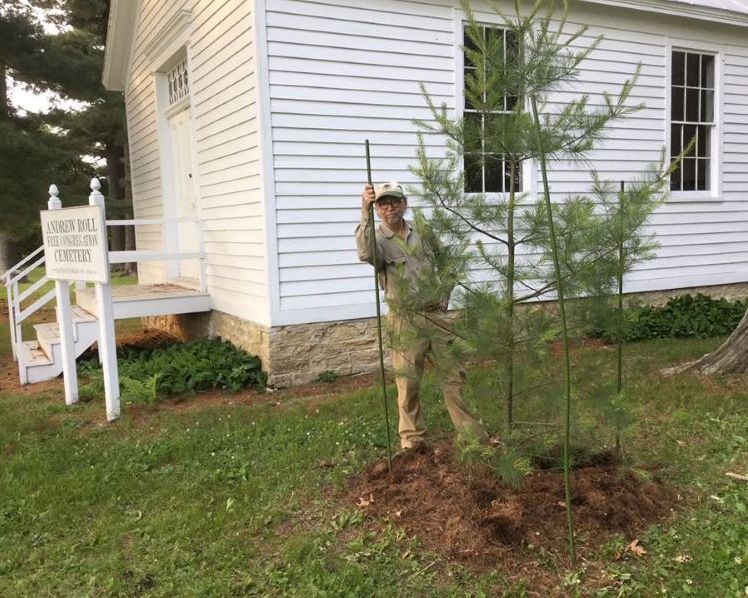
In 2005 the congregation hired its first-ever minister, Rev.Jody Whelden, to be its leader and teacher. Jody, an ordained Unitarian Universalist minister, served part-time for two years, and can be credited with helping to lay the foundation for organizational development and membership growth. When Jody moved on in June of 2007, the congregation initiated an eight-month long search process for a new leader. In March of 2008, the congregation hired Andrew Kerr - an organic produce farmer and University of Chicago Divinity School graduate - as its Speaker. Andrew left in early 2013. Currently, the Congregation uses a panel of Associate Speakers for the congregational year which runs from July 1 - June 30. These Associate Speakers lead our Unitarian-Universalist second and fourth Sunday programs. Associate Speakers for the 2020/21 congregation year are Robin Proud, regular speaker at Prairie Unitarian Universalist Society, Madison and guest speaker for ten UU congregations in Minnesota and Wisconsin; Rob Brink, a protestant minister turned atheist, Dr. Penny Andrews, a hospice chaplain and early member of James Reeb UU and Pema Antoniotti, a Buddhist teacher and hospital chaplain.
By any measure, the survival of the Free Congregation of Sauk County is remarkable: there is no other such Free Thought society on the North American continent (if not in the world) that has operated continuously, with its principles and practices largely unchanged, since the mid-nineteenth century. Today the Free Congregation enjoys steady growth in membership, due in part to a closer relationship, since about 2001, with Unitarian Universalism; due also, no doubt, to the dramatic increase, over the last two decades, in the number of Americans who identify themselves as religiously agnostic or unaffiliated; and, possibly, to the fact that our young century has seen a steep rise in religious fundamentalism and intolerance, both at home and abroad, as well as pitched battles between and within traditional faiths. Perhaps the turbulent first years of the 21st century provide even more incentive for revisiting the values and principles of our Freie Gemeinde founders. Those freethinking pioneers would surely agree: only by understanding our history can we move thoughtfully forward.
Click to go to
Our Facebook page
Contact Form

Our Address, Phone, Email
PO Box 664 - 307 Polk Street
Sauk City, WI 53583
Phone: (608) 643-3131
Email: FreeCongregation@iCloud.com